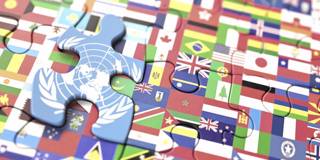Rising nationalism raises a significant risk that the UN system’s structure and institutions, essential but in need of repair and rejuvenation, may instead be left to decline, decay, and even collapse. Such an outcome would be tragic, not just for those institutions but for all of humanity.
NEW YORK – The international community urgently needs new tools, ideas, and initiatives to meet the common threats and challenges faced by the United Nations’ 193 member countries. The world body’s 75th anniversary, to be marked on United Nations Day on October 24, presents an opportunity to chart a path to the partnerships we need to meet the challenges we will face in the years and decades to come. In the wake of the COVID-19 pandemic – the costliest and most far-reaching crisis since World War II – the need for institutional renewal and recovery is obvious.

NEW YORK – The international community urgently needs new tools, ideas, and initiatives to meet the common threats and challenges faced by the United Nations’ 193 member countries. The world body’s 75th anniversary, to be marked on United Nations Day on October 24, presents an opportunity to chart a path to the partnerships we need to meet the challenges we will face in the years and decades to come. In the wake of the COVID-19 pandemic – the costliest and most far-reaching crisis since World War II – the need for institutional renewal and recovery is obvious.